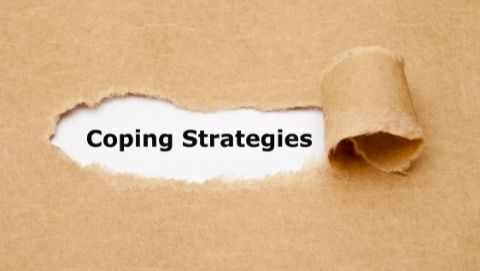Coping Substance Free for Recovery Month
By Maren Voss, ScD, Professional Practice Extension Assistant Professor of Health and Wellness

As you think about mental health, think about the whole picture. When people are struggling with life, they sometimes turn to less than ideal coping mechanisms. You’ve probably heard of retail-therapy—which isn’t therapy at all. It’s a quick fix for feeling better by indulging in the endorphin rush of buying something new. Some people develop gambling or pornography addictions, or become verbally aggressive or violent,which are negative coping styles. It is just as common to turn to substances to give the body a pick-me-up when we are feeling down. Substances like caffeine, smoking, or alcohol all have a psychotropic effect, meaning they change our state of mind.
It’s normal to look for a chemical solution when the stress of life beats us up. One study of employees in a company lay-off found that even without losing their job, the stress of the uncertain work environment increased the use of mind-altering substances (Kivimaki et al., 2007). Short-term coping with chemical help may not be a problem, but when it becomes a regular pattern that leads to poor behavior, it is wise to take precautions.
Substance use disorders (SUD) aren’t diagnosed unless the use becomes a compulsion, and is continuing despite harmful consequences (ASAM, n.d.). But more people are falling prey, with a recent report showing that SUDs doubled between 2000 and 2020 among older adults (HHS, 2020). When addiction problems set in, mental health problems often become worse. In fact, there has long been a debate about which comes first, the SUD or the mental health problem. Struggling with substance use and mental health at the same time is a chicken-egg situation. They often occur together and it’s hard to know which problem is the real problem.
About 20% of people struggling with a mental health disorder also have an SUD (Buckley, 2006). That’s a high percentage. When the two go together, symptoms are typically worse, health declines, people engage in more risky behavior, and bad decisions lead to even more life stress. So a good mental health strategy is to find a healthy way to cope without relying on non-prescription chemicals. This is something we all need to learn, whether or not substance use has been a problem in the past.
The good news is that there are a lot of coping strategies available to us. Even some “bad” coping strategies are ok to use in certain circumstances. For people dealing with chronic pain, avoidance and distraction worked quite well to reduce short term pain (Lit & Tennen, 2015). A recent report on coping with COVID found that it didn’t matter much which strategy people used, as long as it worked for them individually. Even when people didn’t use an evidence-based (EB) coping skill, as long as they reported it as effective and used it often, it resulted in less depression (Wasil et al., 2021). So give yourself a break and don’t stress about how you manage stress!
For dozens of coping strategies you can visit Anxiety and Depression Association of America: https://adaa.org/tips or Harvard Health: https://www.health.harvard.edu/mind-and-mood/best-ways-to-manage-stress. And for substance-free coping, September is Recovery Month with a celebration of overcoming substance misuse and sustaining a life with healthier choices. You can visit Utah Support Advocates for Recovery Awareness website, where they have a list of recovery celebrations happening across the state: https://www.recoveryday.org/ Let’s celebrate substance-free coping to give ourselves a boost to mental health in September!
References
- American Society of Addiction Medicine. Definition of Addiction. https://www.asam.org/Quality-Science/definition-of-addiction
- Buckley, P. F., & Brown, E. S. (2006). Prevalence and consequences of dual diagnosis. The Journal of clinical psychiatry, 67(7).
- Kivimäki, M., Honkonen, T., Wahlbeck, K., Elovainio, M., Pentti, J., Klaukka, T., Virtanen, M., & Vahtera, J. (2007). Organisational downsizing and increased use of psychotropic drugs among employees who remain in employment. Journal of epidemiology and community health, 61(2), 154–158. https://doi.org/10.1136/jech.2006.050955
- Litt, M. D., & Tennen, H. (2015). What are the most effective coping strategies for managing chronic pain?. Pain management, 5(6), 403–406. https://doi.org/10.2217/pmt.15.45
- US Department of Health and Human Services (HHS)(2020). Substance Use Disorder among Older Adults in the United States in 2020. https://citeseerx.ist.psu.edu/viewdoc/download?doi=10.1.1.846.1985&rep=rep1&type=pdf
- Wasil, A. R., Franzen, R. E., Gillespie, S., Steinberg, J. S., Malhotra, T., & DeRubeis, R. J. (2021). Commonly reported problems and coping strategies during the COVID-19 crisis: A survey of graduate and professional students. Frontiers in psychology, 12, 404.


 Utah 4-H & Youth
Utah 4-H & Youth